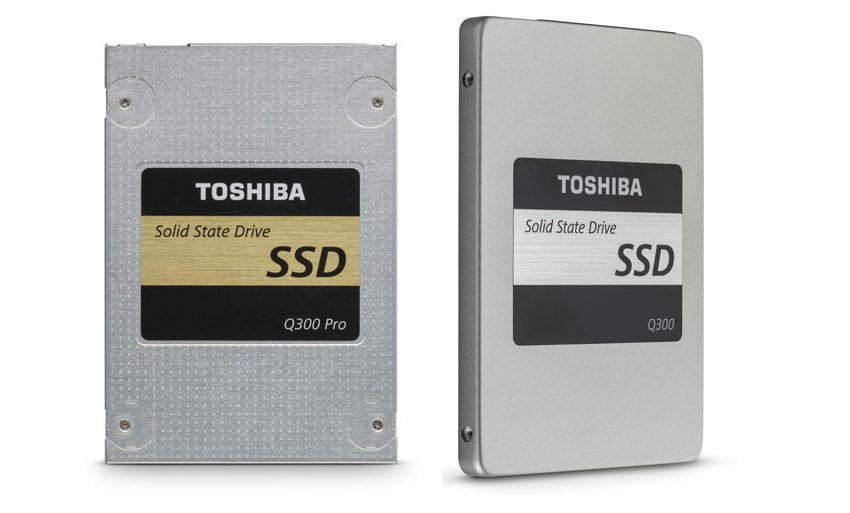Toshiba has announced two new additions to their internal storage portfolio, the Toshiba Q300 Pro Series SSDs, which are built for gaming and creative applications with high-end demand for performance and reliability, and the Toshiba Q300 Series SSDs, which provide consumers looking to upgrade their system with a balance of high performance and value. Both lines are equipped with Adaptive Size SLC Write cache technology, which enables SLC-like performance for high processing speed and low power consumption.

To boast its quoted high-performance sequential read/write performance and endurance, the new Q300 Pro Series of SSDs are built with 2-bit-per-cell NAND MLC flash technology. In addition, it comes equipped with Toshiba’s in-house controller and NAND flash components, which work in parallel to offer greater performance and reliability. The Q300 SSDs also feature the company’s exclusive error correction technology to help ensure high-precision data readout for improved reliability. The Q300 Pro Series come in capacities up to 512GB in a 7mm slim, lightweight aluminum form factor, making it an ideal fit for ultra-thin notebooks and game consoles.
The Q300 Series is built with 3-bit-per-cell NAND TLC flash technology, as well as Toshiba’s in-house controller, and caters more towards mainstream consumers looking upgrade their HDD-based system to solid state technology. That being said, Toshiba indicates that it is still a high-speed SSD and offers upwards of 960GB in storage with a three-year standard limited warranty. In addition, the Q300 line offers ultra-quiet operation, low power consumption and tough shock resistance for greater long-term durability in an ultra-thin 7mm design.
Toshiba Q300 and Q300 Pro Series Specifications
- Capacities
- 960GB, 480GB, 240GB, 120GB (Q300)
- 512GB, 256GB, 128GB (Q300 Pro)
- Interface: SATA 6Gb/s, compatible with SATA 3Gb/s and SATA 1.5Gb/s
- Form Factor: 2.5" type/7mm height case
- Controller:
- Toshiba TC358790 (Q300)
- Toshiba TC58NC1000 (Q300 Pro)
- NAND Type:
- 3-bit-per-cell Flash (TLC) (Q300)
- 2-bit-per-cell Flash (MLC) (Q300 Pro)
- Performance
- Max Sequential Read/Write (MB/s)
- 550/530 (Q300)
- 550/520 (Q300 Pro)
- Max Random Read/Write (MB/s)
- 87K/83K (Q300)
- 92K/63K (Q300 Pro)
- Reliability
- MTTF (Mean Time To Failure): 1,500,000 hours
- TBW (Total Bytes Written)
- 960GB: 240TB /480GB: 120TB /240GB: 60TB /120GB: 30TB (Q300)
- 512GB: 320TB /256GB: 160TB /128GB: 80TB (Q300 Pro)
- TRIM Support
- Garbage Collection
- Advanced Speed Technology
- Adaptive Size SLC Write cache technology
- Read Only Mode
- QSBC ECC (Quadruple Swing-by Code) Error Correction Technology
- Patrol Read Technology (Q300 Pro)
- Thermal Control Sensor (Q300 Pro)
- SMART Support
- Accessories: Spacer for 9.5mm drive bay
- Warranty
- 3-Year Standard Limited Warranty
- 5-Year Standard Limited Warranty
Pricing and availability
Both the Q300 and Q300 Pro are now available for purchase for the following prices:
- Q300 Pro Series Internal SSDs
- $124.99 – 128GB
- $199.99 – 256GB
- $389.99 – 512GB
- Q300 Series Internal SSDs
- $99.99 – 120GB
- $159.99 – 240GB
- $309.99 – 480GB
- $449.99 – 960GB




 Amazon
Amazon